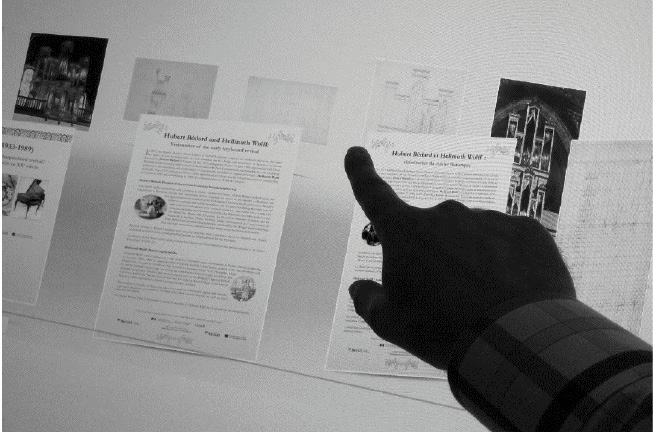Hi, Community.
We are thrilled to have found and to share this beautiful article ‘Touch Tables for Special Collections Libraries: Curators Creating User Experiences’ written by Anna Dysert, Sharon Rankin, and Darren N. Wagner from McGill University.

This insightful and intelligent memoir describes the implementation of touch table technology (hardware & software) for McGill University Library’s two special collections: Osler Library of the History of Medicine and the Marvin Duchow Music Library. Each exhibition curator used a different software platform for creating touch table experiences, Intuiface and Open Exhibits.
The article reviews literatures on the use of touch tables in libraries and discusses the vision behind incorporating touch table technology into McGill’s special collections as well as the rationale behind the choices of software and hardware, providing lessons learned and some preliminary recommendations of best practices for curators and librarians to create visually pleasing touch table user interfaces in a short amount of time without particular programming or coding skills.
Most Importantly, we are happy to have discovered that Intuiface is the software of choice for one of the leading universities in the world and one the most important academic collections in Canada.
Below are some extracts from the article highlighting the experience with Intuiface. You can find the original article here.
McGill University’s Review on ‘Intuiface’ Software
“Both touch table user experiences were created using IntuiFace software from Intuilab, a company headquartered in France whose mission statement, “to offer a software platform—IntuiFace—to empowering anyone, of any skill set and in any business, to create and deliver gratifying and purposeful interactive and connected experiences on multiple devices, in record time and without coding software,” is an apt and accurate description. The Music Library curator, Rankin, a librarian with limited technical skills and no programming capabilities, was able to build the user experience in IntuiFace within a very short time frame. After working through the company’s online tutorials, the curator created scenes, selected asset types to control the digital object displays, configured their properties, and created event triggers to link user touches to specific actions in the experience, all within the IntuiFace Composer software. The Composer provided the curator complete control over choice of color palette, font, background images for each scene, and display properties of the digital objects. The system is designed to allow the curator to create the experience on a computer other than the touch table. From within the IntuiFace Composer, it is possible to run the IntuiFace Player to see how the experience will look and react to user interaction. The completed experience was published in the Intuilab cloud and remotely deployed to the touch table, whose IntuiFace Player software will run the experience.”
“The pilot project was successful from both the user and creator perspectives. The Music Library received very positive feedback about the experience. The time invested to learn the IntuiFace platform was repurposed by the curator, who went on to create several subsequent special collections exhibitions in 2016.”
"Since the summer of 2016, beginning with the Music Library’s John Rea’s Musical Universe, McGill special collections librarians and staff have created twenty touch table experiences in IntuiFace and seven are currently on the schedule for the 2018–2019 academic year. This statistic alone is a testament to the success of the platform and its ease of use. The first pilot exhibition Knowing Blood / Sang sens was reworked by Rankin and Wagner into IntuiFace and was used in September 2016 during Science Literacy Week. Interestingly, in the lessons learned paper describing the Hive project (the first integrated public/university library and history center in Europe), the authors surveyed the variety of programming languages available for creating multitouch applications and include Open Exhibits, referring to it as a “multi-user toolkit…including over 50 different customisable user interface components making it easy to efficiently develop applications without much technical expertise. For instance, it is feasible for a technical museum curator to create their own exhibits by plugging together these components without any developer assistance. "
“McGill Library currently has four staff members (three librarians and one digitization administrator) trained to use IntuiFace. We would like to grow this capacity for several reasons, most notably to provide the opportunity for all special collections librarians to create and complete an experience from start to finish, allowing them both to have the highest level of curatorial control over digital exhibitions and the knowledge to work in collaboration with faculty or student co-curators. Our pilot project received a Year Two round of funding, enabling a purchase of a second Ideum touch table; and, with additional support from McGill undergraduate students, we now have a third Ideum touch table as of the fall of 2017, so we have technology to grow our special collections exhibitions on touch tables across all of the McGill libraries.”